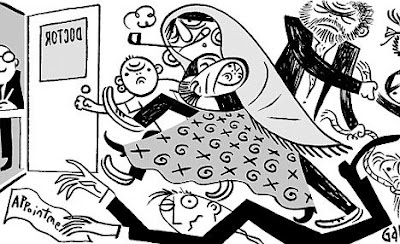 On Friday, my older brother forwarded me a Twitter campaign asking people to visit the Daily Mail's website and take part in the following poll:
On Friday, my older brother forwarded me a Twitter campaign asking people to visit the Daily Mail's website and take part in the following poll:Should the NHS allow gipsies (sic!) to jump the queue?
The poll was successfully hijacked. 93% voted in favour of prioritised healthcare for gypsies and it was removed from the website. The Daily Mail, presumably very embarrassed, hastily replaced it with a poll asking whether Commons speaker Michael Martin should resign ("He resigned four weeks ago," notes the Christian think-tank Ekklesia). This impressive -and extremely funny- piece of media sabotage was an interesting example of how new social networking devices can be successfully used to political ends. And it's a nice retort to my last post about British apathy.
Now, criticising the Daily Mail for being offensive is a bit like criticising a dog for barking. It may be annoying as hell, but it would be exhausting to get angry every time it happened. And the author of the column that triggered the poll, Richard Littlejohn, seems to be a living parody of the worst bits of the Mail's output. A quick bit of research has revealed that he is notorious for his hatred of gypsies, muslims, Palistinians, asylum seekers, gay people and liberals. All of this hating clearly doesn't leave the poor guy much time for thinking.
That's not really what I want to talk about. Dismantling Littlejohn's poorly-written, tasteless column line-by-line would be rather like shooting the proverbial fish in the barrel. But something else attracted my attention about the rant, namely the cartoon (above) that accompanied it on the page. I showed it to a friend at the weekend and told her it was from the Daily Mail. She asked what year, and to her amazement I told her it was printed last week.
"I thought it was from the 1930s!" she exclaimed.
This is exactly the point. Because, in spite of Littlejohn's claims that the gypsies are not an ethnic group at all and are therefore not entitled to any governmental safeguards, this picture looks suspiciously like a Nazi-era racist caricature. Note, for example, the father figure pulling the horse into the hospital waiting room. He possesses a fine monobrow, as does the child to his right being dragged into the frame. As a monobrow wearer myself, this makes him an instantly handsome and admirable fellow in my book. We all know, after all, that monobrows are the Rolls Royce of the eyebrow world. To the cartoonist, however, this is simply negative ethnic shorthand.
Then there is the implied violence in the cartoon. The British tax-payer figure is being trampled into the ground by the grotesquely-drawn gypsy stampede. This may be figuratively intended, but it's extremely irresponsible and adds an element of physical threat to the fictional scenario (NHS research shows that gypsy communities' approaches to healthcare makes them very reluctant to seek medical treatment). It's the classic Joseph Goebbels logic: if you want to take people to war, tell them they're being attacked.
The Economist recently wrote with regard to Silvio Berlusconi's anti-immigration rhetoric in Italy: "The danger is that many a racist thug may now think he has tacit support from the prime minister."
How long until a racist thug in Britain feels he has tacit support from the British press in getting his own back on gypsies? Since its inception, the Daily Mail has been nurturing a climate of intolerance towards minorities. The disturbing thing when its cartoonists follow suit is that the historical precedents for the demonisation of ethnic groups become even more evident.

Now, however, we have new weapons to fight against the old methods. The reactionary media may still be taking people to war but, with the increasing shift towards interactive digital media, the battle lines are being redrawn. Social networking sites, as we saw with last week's successful Twitter campaign, provide us with the opportunity to mobilise large numbers of people in a short space of time and make a statement through direct action.
"Don't die in the waiting room of the future", says an old East German punk slogan. I couldn't agree more. Let's jump the queue instead...

Now, however, we have new weapons to fight against the old methods. The reactionary media may still be taking people to war but, with the increasing shift towards interactive digital media, the battle lines are being redrawn. Social networking sites, as we saw with last week's successful Twitter campaign, provide us with the opportunity to mobilise large numbers of people in a short space of time and make a statement through direct action.
"Don't die in the waiting room of the future", says an old East German punk slogan. I couldn't agree more. Let's jump the queue instead...


